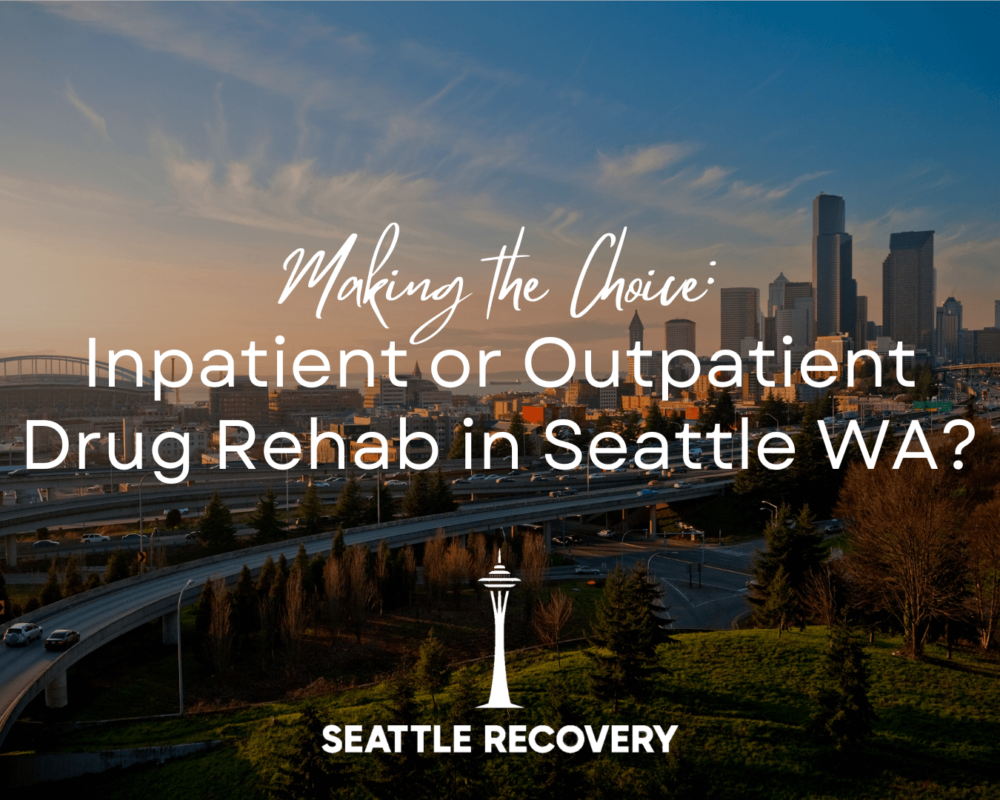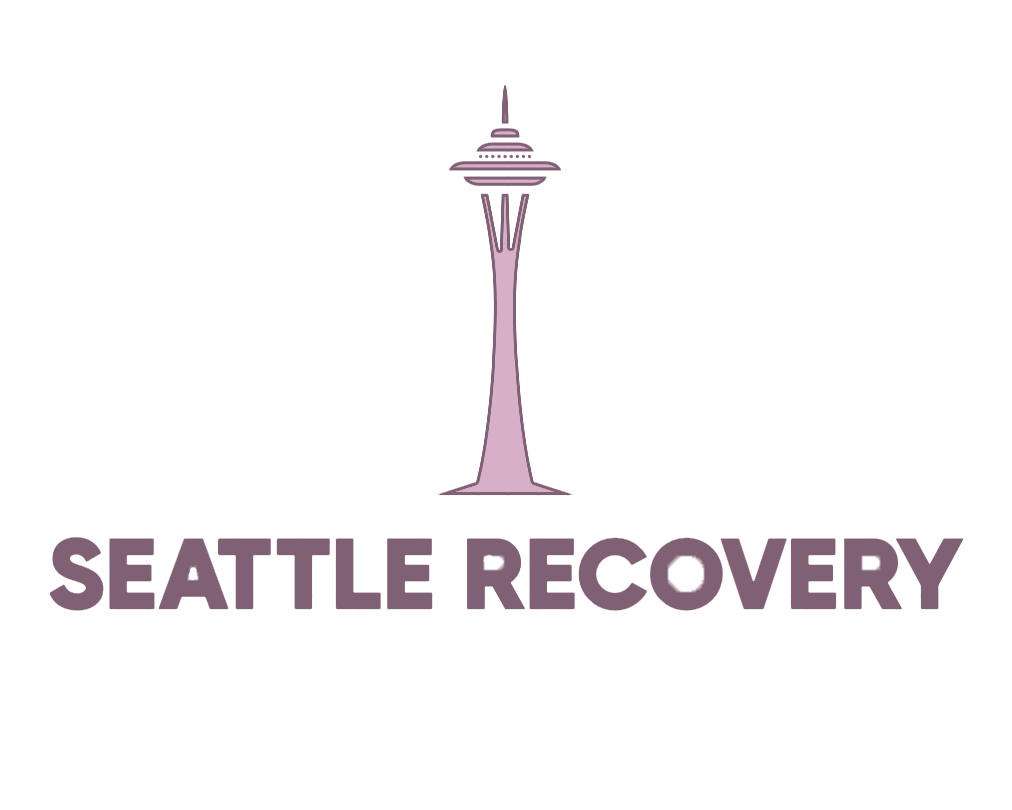Finding the right path to recovery from addiction can be a challenging journey, especially if you’re trying to decide between inpatient and outpatient drug rehab in Seattle WA. Both have their benefits, and choosing the right one could make a major difference in your journey toward sobriety. Here at Seattle Recovery, we’re committed to helping you understand your options so you can make an informed decision. This guide will break down the ins and outs of each approach, explore the advantages, and provide tips on choosing the option that fits your lifestyle, needs, and long-term goals.
Here at Seattle Recovery, we’re dedicated to helping you navigate these options, ensuring you fully understand the implications of each path. Our team is here to empower you with the information you need to make an informed decision that aligns with your lifestyle, personal needs, and long-term goals.
In this comprehensive guide, we will break down the ins and outs of each approach, delve into the advantages and limitations, and provide practical tips on how to choose the option that best suits your unique situation. With the right support and guidance, you can take confident steps toward a healthier, sober future.
What’s the Difference Between Inpatient and Outpatient Drug Rehab?
Before diving into the specifics of each option, let’s clarify what makes inpatient and outpatient drug rehab in Seattle WA different.
- Inpatient Rehab: Inpatient, or residential, rehab requires patients to live at the treatment facility for the duration of their program. This immersive approach is ideal for individuals who need a structured environment shielded from daily stressors and potential triggers that could lead to relapse. Patients benefit from 24/7 access to medical professionals and emotional support, which is particularly advantageous for those grappling with severe addictions or co-occurring mental health diagnoses. The program typically includes a comprehensive treatment plan that encompasses therapy sessions, group activities, and skill-building exercises to help individuals develop coping mechanisms and strategies for long-term recovery.
- Outpatient Rehab: Outpatient rehab offers a more flexible option, allowing individuals to live at home while attending scheduled therapy sessions at a treatment center. This arrangement enables participants to maintain their daily responsibilities, such as work, school, or family commitments, which can help ease the transition back into everyday life. Outpatient programs vary widely in intensity and structure, ranging from part-time options that meet a few times a week to more intensive daily sessions. This flexibility can be particularly beneficial for those with supportive home environments, as it allows them to practice newly learned skills in real-life situations while receiving ongoing professional guidance.
The choice between inpatient and outpatient drug rehab in Seattle WA often depends on the severity of addiction, lifestyle, and personal preferences. Let’s explore each option in detail to help you understand which may be right for you.
Advantages of Outpatient Drug Rehab in Seattle WA
For many people, outpatient rehab offers a flexible, affordable, and effective way to pursue recovery. Here’s why outpatient drug rehab in Seattle WA might be the right choice for you.
1. Maintaining Daily Responsibilities
One of the biggest benefits of outpatient rehab is that it allows you to continue working, attending school, or taking care of family obligations. This flexibility is invaluable for people who can’t take a break from their daily lives but still need support to overcome addiction. Many outpatient programs offer evening or weekend sessions to accommodate busy schedules.
2. Cost-Effective Treatment Option
Inpatient rehab can be costly due to the round-the-clock care and lodging costs. On the other hand, outpatient drug rehab in Seattle WA is generally more affordable because you’re not paying for room and board. This makes outpatient programs accessible to more people, particularly if they have insurance that covers outpatient care. Cost is a significant factor in choosing the right program, and outpatient treatment can offer a more budget-friendly option without compromising on quality.
3. Building Community Connections
Outpatient programs often encourage patients to get involved with local support groups like Alcoholics Anonymous (AA) or Narcotics Anonymous (NA). This connection with the Seattle recovery community can be incredibly supportive, providing a sense of belonging and additional accountability. Being part of a local network of people who are also in recovery can be motivating and comforting, especially when facing challenges.
4. Applying Skills in Real Time
In outpatient rehab, you attend therapy sessions and then return to your everyday environment, where you can immediately apply what you’ve learned. This real-world application of coping skills and relapse prevention strategies can be invaluable, as you can directly test what works and make adjustments with the support of your therapist. Practicing these skills in real time often helps solidify them, increasing the chances of long-term success.
5. Tailored Treatment Plans
At Seattle Recovery, our outpatient programs are customized to fit the unique needs of each individual. We recognize that every person’s journey to recovery is different. Outpatient treatment can include individual therapy, group counseling, family therapy, relapse prevention education, and holistic therapies, all designed to address the root causes of addiction and build a strong foundation for recovery.
Advantages of Inpatient Drug Rehab
While outpatient treatment offers many benefits, inpatient rehab may be more suitable for people facing severe addiction or co-occurring mental health issues. Here’s why inpatient rehab might be a better option.
1. 24/7 Medical and Emotional Support
For individuals dealing with serious addiction or withdrawal symptoms, the 24/7 supervision provided by inpatient rehab is often essential. In an inpatient setting, medical professionals are available around the clock to manage withdrawal symptoms and offer emotional support. This level of supervision ensures that patients are safe and supported at all times, which is particularly crucial during the initial stages of recovery.
2. Structure and Routine
Inpatient rehab provides a highly structured environment where each day is planned with therapeutic activities. This kind of routine minimizes distractions and keeps the focus on recovery. For those who have been struggling with addiction for a long time, a structured setting can help them relearn healthy habits and routines that are free from substance use.
3. Distance from Triggers
Sometimes, the home environment itself is a trigger. Family conflicts, toxic relationships, or access to substances can make outpatient rehab challenging. Inpatient rehab provides a safe, substance-free space where patients can distance themselves from these triggers, making it easier to focus entirely on recovery without the temptation to relapse.
4. Peer Support
In inpatient rehab, patients have the chance to build meaningful relationships with others who are on the same journey. Group therapy and shared experiences foster a sense of camaraderie and understanding, which can be incredibly healing. Many people find strength and motivation from these bonds, knowing they’re not alone in their struggles.
5. Holistic Treatment Approach
Inpatient programs often provide additional therapies like yoga, meditation, exercise, and art therapy, which can be difficult to incorporate in an outpatient setting. These holistic treatments address both the body and mind, promoting overall wellness and helping patients develop healthier coping mechanisms.

Key Factors to Consider When Choosing Between Inpatient and Outpatient Rehab
Deciding on the best type of rehab program requires an honest evaluation of your needs, lifestyle, and support system. Here are some key factors to consider when choosing between inpatient and outpatient drug rehab in Seattle WA.
1. Severity of Addiction
If you’re dealing with a severe or long-standing addiction, inpatient rehab might offer the structure and intensity needed for recovery. For milder cases or individuals who have already undergone some treatment, outpatient rehab may provide enough support to stay on track.
2. Presence of Co-Occurring Mental Health Conditions
If you have a dual diagnosis (both addiction and a mental health condition like depression or anxiety), you may benefit from the more intensive, supervised setting of inpatient rehab. Inpatient facilities often have mental health professionals on staff who can offer specialized treatment for both conditions.
3. Support System
A strong, supportive network of friends or family can be a huge asset in outpatient rehab. If you have a safe, stable home environment, outpatient treatment can be effective. However, if your home life is chaotic or lacks supportive individuals, the controlled environment of inpatient rehab may be more beneficial.
4. Personal Responsibility and Motivation
Outpatient rehab requires a significant amount of personal responsibility and self-discipline. Since you’ll be attending sessions while managing daily life, it’s important to be committed and motivated to stick with the program. If you’re uncertain about staying on course without supervision, inpatient rehab may provide the accountability you need.
5. Financial Considerations
Inpatient rehab can be more costly due to the cost of lodging and 24/7 care. Many insurance plans cover inpatient rehab, but out-of-pocket expenses can still be high. Outpatient rehab is generally less expensive, making it a more feasible option for those on a budget. Always check with your insurance provider to understand your coverage options before making a decision.
Why Choose Seattle Recovery for Outpatient Drug Rehab in Seattle WA?
If you’re considering outpatient drug rehab in Seattle WA, Seattle Recovery offers a comprehensive program designed to meet the needs of each individual. We’re dedicated to providing high-quality, evidence-based treatment in a compassionate and supportive environment. Here’s what sets us apart:
Personalized Treatment Plans
Every journey to recovery is unique, and so are our treatment plans. Our outpatient program is tailored to each person’s specific challenges, strengths, and goals. This personalized approach ensures that you’re receiving the right kind of care for your unique situation.
Experienced and Compassionate Staff
Our team at Seattle Recovery is composed of skilled, empathetic professionals who are passionate about helping people achieve sobriety. From licensed therapists to addiction specialists, we have a team that’s dedicated to supporting you every step of the way.
Flexible Scheduling
We know that life doesn’t stop for recovery. That’s why our outpatient program offers flexible scheduling options, including evening and weekend sessions, to help you maintain work, school, or family responsibilities.
Holistic and Evidence-Based Therapies
Seattle Recovery’s outpatient program incorporates a mix of traditional, evidence-based treatments like cognitive-behavioral therapy (CBT) and dialectical behavior therapy (DBT), along with holistic therapies that focus on overall wellness. This comprehensive approach helps address the root causes of addiction and promotes a balanced, healthier lifestyle.
Support for Long-Term Recovery
Recovery doesn’t end when the program does. We focus on equipping you with the skills, tools, and resources you need for long-term sobriety. From relapse prevention education to aftercare planning, our team is here to support you even after you complete the program.
FAQs About Outpatient Drug Rehab in Seattle WA
1. Can outpatient rehab be effective for long-term recovery?
Yes, outpatient rehab can be very effective, especially for those with a solid support system and a high level of motivation. Many people successfully maintain long-term sobriety through outpatient programs.
2. How long does outpatient rehab last?
The length of outpatient rehab can vary, but it typically lasts between 3 to 12 months. The duration depends on your needs, progress, and goals.
3. Is outpatient drug rehab in Seattle WA covered by insurance?
Most insurance plans offer coverage for outpatient rehab, but it’s important to check your specific policy. Our team at Seattle Recovery can assist you with understanding your insurance benefits.
4. Can I switch from inpatient to outpatient rehab?
Absolutely. Many individuals start with inpatient care and transition to outpatient treatment as they progress in their recovery journey.
5. What types of therapy are offered in outpatient rehab?
Outpatient rehab at Seattle Recovery includes individual counseling, group therapy, family therapy, and relapse prevention education, as well as holistic therapies like meditation and mindfulness.
Taking the First Step Toward Recovery
Making the decision to seek help is a courageous first step. Whether you choose inpatient or outpatient drug rehab in Seattle WA, the important thing is committing to your health and well-being. At Seattle Recovery, we’re here to support you every step of the way. If you have questions or want to learn more about our outpatient program, don’t hesitate to reach out. We’re here to help you take control of your life and work towards a brighter, healthier future.







